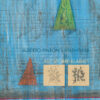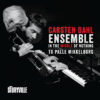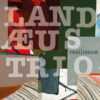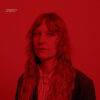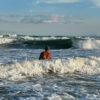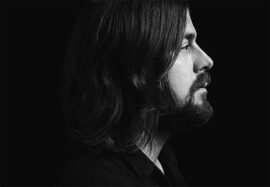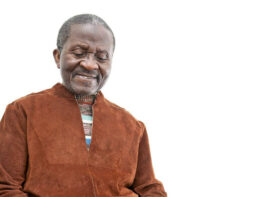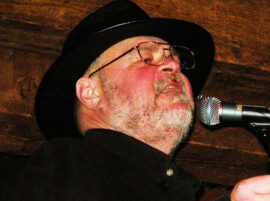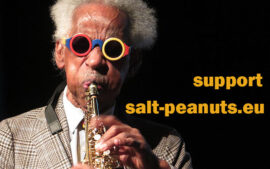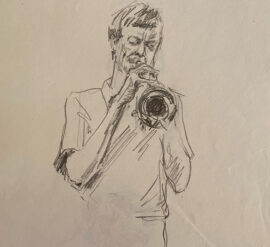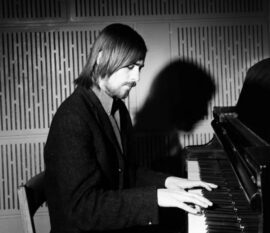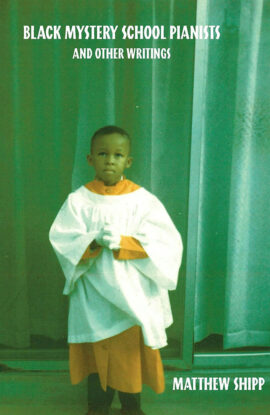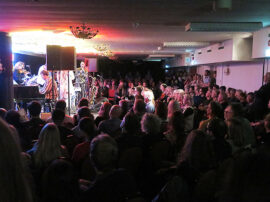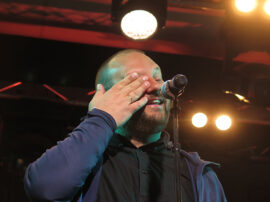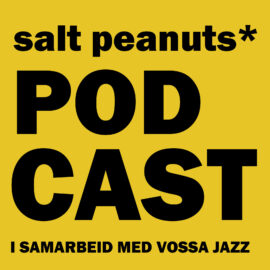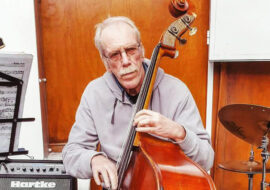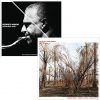
Portuguese sax hero Rodrigo Amado leads a few great bands – the international ones This Is Our Language (with Joe McPhee, Kent Kessler and Chris Corsano) and The Bridge (with Alexander von Schlippeenbach, Ingebrigt Håker Flaten and Gerry Hemingway) and the ones with local musicians – Motion Trio (with Miguel Mira and Gabriel Ferrandini), The Attic (with Gonçalo Almeida and Dutch Onno Govaert) and Refraction Quartet (with João Almeida, Hernâni Faustino and João Valinho). These bands stress how ell-versed he is in the jazz legacy, and, obviously, its great tenorists, from both sides of the Atlantic, as well as his own quest to establish his own personal voice in dialog with this great legacy.
Refraction Solo is Amado’s debut solo album, playing an old horn, a Selmer Balanced Action tenor saxes from 1951 at the Church of The Holy Ghost (Igreja do Espírito Santo) in Caldas da Rainha, Portugal, in July 2021, with the presence of his family. It was one of his first concerts right after the pandemic started to ease down, and after Amado investigated classic jazz pieces during the pandemic and decided that solo performances would be his way of sublimating the energy and the ideas of the pandemic years.
He declares clearly and loudly the course of his musical journey with the symbolic title of the first piece, the 21-minute «Sweet Freedom», referencing two iconic albums – Sonny Rollins’ Freedom Suite (RLP,1958) and McPhee’s Sweet Freedom- Now What? (hat Art, 1995). He mentions Rollins’ huge, solid core sound and McPhee’s ability to totally abandon himself to the music and also for his way of balancing the most primal and pure roots with an authentic spiritual vibe. Amado converses and questions the influential sound, phrases, articulation and vocabularies of Rollins and McPhee, and traces their spiritual energy. He does so in a contemplative, emotional yet poetic series of songs of consciousness, often almost as Ayler-ian folk songs, as Stuart Broomer observes in his liner notes, while solidifying the lineage of his sax voice within the jazz legacy.
The following, shorter «Singular Blow» and «Shadow Waltz», deepen the melodic veins in Amado’s intuitive and intimate improvisations. «Singular Blow» is rooted in the blues, and repeats a beautiful theme until it erupts with rough edges, while «Shadow Waltz» is a playful and touching, dance song that ends with a brief emotional scream. An inspiring and beautiful performance.
Love Ghosts is the third album of Amado’s trio The Attic (with a title that plays with the children’s book The Ghost in The Attic, as the title of the trio’s previous album Summer Bummer, recorded at Summer Bummer Festival in Antwerp, played with the popular song of Lana Del Rey) – with fellow Portuguese double bass player Gonçalo Almeida and Dutch drummer Onno Govaert, and it was recorded at Namouche Studios in Lisbon in January 2020. This trio’s dynamics lie in collective, slow-cooking and muscular improvisations, and the credit for the four extended pieces is given to the three musicians.
The opening, piece «New Tone» features Amado improvising on a post-bop theme while Almeida and Govaert alternate between free and driving pulses that push Amado’s sax flights higher and higher. The spirit of «Encounter» is more balladic and enables Amado to articulate the passionate theme, patiently intensify the emotional tension and still negotiate with Almeida and Govaert. They, again, suggest an elliptical, free pulse that occasionally flirts with familiar rhythmic patterns. The following, title piece adds more drama and freedom to the lyrical veins and sketches a nuanced and layered story where the trio takes its time to develop its powerful momentum, with exquisite arco and pizzicato playing of Almeida and imaginative cymbals work of Govaert. Almeida and Govaert’s percolating rhythm section eventually launches Amado into one of his possessed, ghosts exorcising solos. The title of the last piece «Outer Fields» captures faithfully its ‘out’ vibe. This piece gradually built its power and shifts its energies from the sparse and soulful into the free and spiritual fire, in the most liberating manner. Simply masterful.
Eyal Hareuveni
……….
Den portugisiske saksofonisten Rodrigo Amado er en musiker vi har hørt tidligere både på flere konserter og plater med Joe McPhee, Kent Kessler, Chris Corsano og hans Motion Trio. De senere årene har han markert seg som en viktig stemme i det nyere, europeiske jazzlandskapet, og dette er den andre plateutgivelsen med trioen The Attic, etter starten med «Summer Bummer» (NoBusiness Records) kom i 2019 (anmeldt HER).
Trioen består fremdeles av Rodrigo selv på tenorsaksofon, Goncalo Almeida på bass og Onno Govaert på trommer. Alle komposisjonene er gjort av trioen i fellesskap, og innspillingen er gjort i Lisboa den 12. januar 2020.
Vi får fire, relativt lange låter, og de åpner med «New Tone» og Almeidas tunge bass-spill over et «lekent» og «løst» trommespill. Etter hvert kommer Amado inn med veldig Coltrane-lignende spill. Han har mye av den samme intensiteten i spillet, og spillet er svært overbevisende.
Og det Coltrane-aktige ligge sigger som et bakteppe gjennom hele denne fine innspillingen. I «Encounter», tar de det litt ned, men musikken er like intens og insisterende, med relativt tungt og fint bass-spill og et trommespill som nærmer seg Jon Christensen.
I tittelsporet, «Love Ghosts» tar de det enda mer ned i starten, med strykebass og sterke markeringer i trommene. Dette er platas frieste låt, og man blir sittende å følge intenst i alt de tre musikerne foretar seg, hvor Coltrane (og innimellom også ting vi husker fra Pharoah Sanders), før de runder av med «Outer Fields», hvor de heller ikke «tar helt av». Fint bass-spill i introen, før han legger seg i det tunge landskapet og de andre inviteres inn, og vi får en nydelig ballade hvor Amado leverer strålende saksofonspill i nydelig kontrast til det insisterende bass-spillet og de «lekne» trommene. Dette er en låt som vokser etter hvert, hvor det ender opp med en slags Coltrane-hyllest, som er strålende, kreativ, spennende og drivende.
Dette er blitt en fin plate fra The Attic, med tre musikere med mye tyngde i spillet, og med røttene godt plassert i 60-tallets mest spennende jazzmusikk, men hele tiden med blikket rettet framover.
Jan Granlie
Rodrigo Amado (ts), Goncalo Almeida (b), Onno Govaert (dr)


